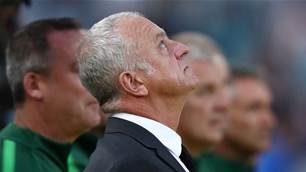THE UPDATED national curriculum is a roadmap to international success and will transform the Socceroos over the next six or seven years, says national technical director Han Berger.
FFA has released the second edition of the FFA National Football Curriculum to help facilitate what they call a “fundamental transformation of football in Australia”.
The new FFA National Football Curriculum: The Roadmap to International Success is now freely available as an e-book by clicking here.
Communicating and implementing the curriculum is seen as key, said Berger, who was adamant the winning at all costs mentality has, and will continue, to hurt the game’s development.
"Because, at this moment it’s not really in the Australian psyche," he said. "But the fact of the matter is the big picture and at top level you can’t be consistently successful with a physical direct playing style."
The update is a detailed document containing Model Sessions for every phase and explains how to design sessions and plan six-week training cycles for a season.
“Celtic beat Barcelona in a one-off in the Champions League. So yes, in a one-off, you might win - but on a consistent basis, it’s not a way to go because modern top level football has moved away from that," he said.
“And we want...exposure to make people aware of it."
This change can also be seen in the teams coached by the best local A-League coaches such as Ange Postecoglou, Graham Arnold, Alistair Edwards and Tony Popovic, said Berger.
The Dutchman pointed to the Young Socceroos at the recent FIFA U20 World Cup in Turkey as an example of how the game is slowly changing in this country.
He said at the previous two youth World Cups, the Australians were there simple to make up the numbers.
But last July the Young Socceroos exhibited a technical brand of football that was pleasing, although it was let down by naïve defending, he said.
This was part of what he said was the continuing transformation at grassroots level from playing “fightball” – where physicality and winning were most important – to playing effective, possession-based football in a 1-4-3-3 system.
“And explained in a way easily for parents to understand," he said. "I do realise that to really make this fundamental transformation happen, there needs to be a shift in culture and mentality.
"And those processes don’t happen overnight."
Berger - whose current contract runs out next year - sees the national curriculum as his parting legacy to the game in Australia, and believes that continuing on the current path will result in a better Socceroo side in years to come.
“I’m convinced that only a consistent, structured, long-term approach will help us to develop consistently generations of players and make Australia competitive at the top level," he said.
“These types of processes in established football countries like Germany, it took a decade. And that is the minimum – and they have all the resources and money to make that happen and accelerate those processes.
“That’s the difficult selling point of us as people tend to look at results next year – no. If everything goes perfect and all the resources are available, history shows those processes take about a decade. So we’re three or four years into it and only touched the surface."
While the philosophy is visionary, Berger hopes grassroots coaches and players will buy into that vision and implement the ideas.
“The success stands or falls with how much and how deep it will be embraced," he said. "We have several initiatives already to make that happen.
"One of that is our coaching courses... and trying to convince them why this makes sense."
Berger added that for each NPL club, the national curriculum will be compulsory.
And he stressed that the update was underpinned by best practice methods and analysis and scientific research
This second edition of the National Curriculum introduces detailed training sessions and models to enable coaches to deliver the methods central to the implementation of the playing philosophy outlined in the first version in 2009.
“The first version of the National Curriculum in 2009 was a breakthrough in setting out a broad agenda, but this second version is presented in a way that will resonate in schools, clubs, academies and elite development pathways, in fact anywhere football is played,” said FFA CEO David Gallop.
Since the introduction of the first National Football Curriculum in 2009, the understanding of it in the broader football community needed improving, especially at grassroots level, said Berger.
He added: “Only if you have a strong and broad foundation then ultimately your summit will be of top quality.
“The first edition mainly explained the philosophical starting points, but lacked detailed explanation and practical examples.
"This new version is aimed at a fundamental transformation of the way football is played and coached in Australia, especially at youth level, in order to develop future generations of players and teams that will enable Australia to maintain a leading position in world football, particularly within the Asian Football Confederation."
Copyright © FourFourTwo Australia . All rights reserved.
Related Articles

Backlash over Fox Sports new season launch

W-League, A-League set for world-first equal marketing split













